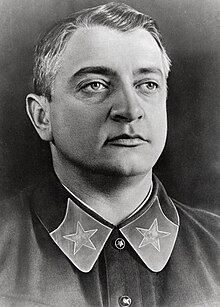Mikhail Tukhachevsky Михаил Тухачевский | |
|---|---|
 Tukhachevsky circa 1935 | |
| Birth name | Mikhail Nikolayevich Tukhachevsky Михаил Николаевич Тухачевский |
| Nickname(s) | Red Napoleon |
| Born | 16 February 1893 Alexandrovskoye, Dorogobuzhsky Uyezd, Smolensk Governorate, Russian Empire |
| Died | 12 June 1937 (aged 44) Moscow, Russian SFSR, Soviet Union |
| Buried | |
| Allegiance | |
| Service | |
| Years of service | 1914–1937 |
| Rank | |
| Commands | Chief of General Staff |
| Battles / wars | World War I Russian Civil War Polish–Soviet War |
Mikhail Nikolayevich Tukhachevsky (Russian: Михаил Николаевич Тухачевский, romanized: Mikhail Nikolayevich Tukhachevskiy, IPA: [tʊxɐˈtɕefskʲɪj]; 16 February [O.S. 4 February] 1893 – 12 June 1937), nicknamed the Red Napoleon,[1] was a Soviet general who was prominent between 1918 and 1937 as a military officer and theoretician. He was later executed during the Moscow trials of 1936–1938.
He served as an officer in World War I of 1914–1917 and in the Russian Civil War of 1917–1923, leading the defense of the Moscow district (1918), commanding forces on the Eastern Front (1918), commanding the Fifth Army in the recapture of Siberia from Alexander Kolchak, and heading Cossack forces against Anton Denikin (1920). From 1920 to 1921 he commanded the Soviet Western Front in the Polish–Soviet War. Soviet forces under his command successfully repelled the Polish forces from Western Ukraine, driving them back into Poland, but the Red Army suffered defeat outside of Warsaw, and the war ended in a Soviet defeat. Tukhachevsky blamed Joseph Stalin for his defeat at the Battle of Warsaw.[2][3][4]
He later served as chief of staff of the Red Army from 1925 to 1928, as assistant in the People's Commissariat of Defense[5] after 1934 and as commander of the Volga Military District in 1937. He achieved the rank of Marshal of the Soviet Union in 1935.
As a major proponent of modernisation of Soviet armament and army force structure in the 1920s and 1930s, he became instrumental in the development of Soviet aviation, and of mechanized and airborne forces. As a theoretician, he was a driving force behind the Soviet development of the theory of deep operations in the 1920s and 1930s. Soviet authorities accused Tukhachevsky of treason, and after he confessed during torture, he was executed in 1937 during the military purges of 1936–1938, led by Stalin and Nikolai Yezhov.
- ^ Котельников, Константин (November 11, 2022). "'Красный Наполеон' Михаил Тухачевский". Diletant (Дилетант).
- ^ Brackman, Roman (2004). The Secret File of Joseph Stalin: A Hidden Life. Routledge. ISBN 978-1-135-75840-0.
- ^ Grey, Ian (1979). Stalin, Man of History. Doubleday. p. 482. ISBN 978-0-385-14333-2.
- ^ Davies, Norman (2001). Heart of Europe: The Past in Poland's Present. OUP Oxford. p. 103. ISBN 978-0-19-164713-0.
- ^ Cite error: The named reference
:0was invoked but never defined (see the help page).